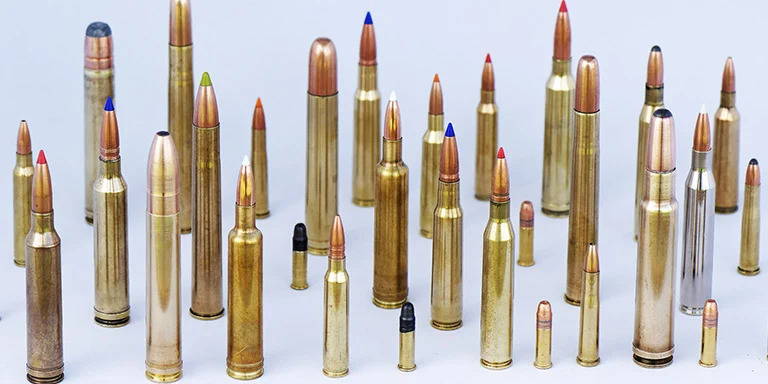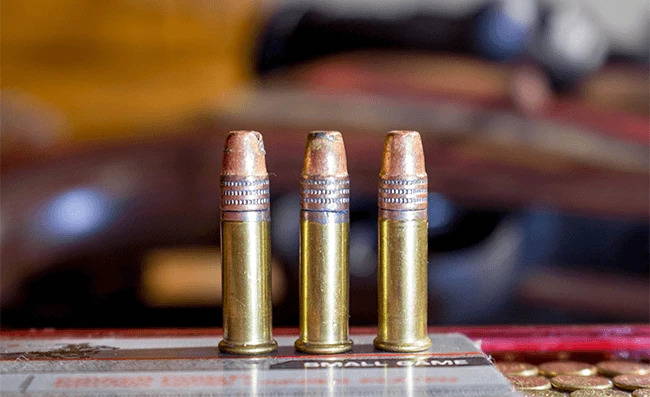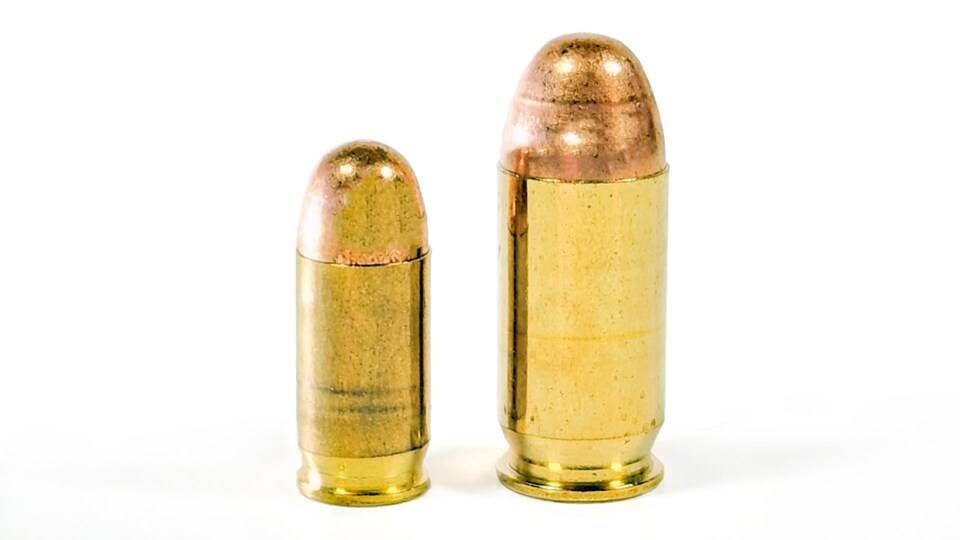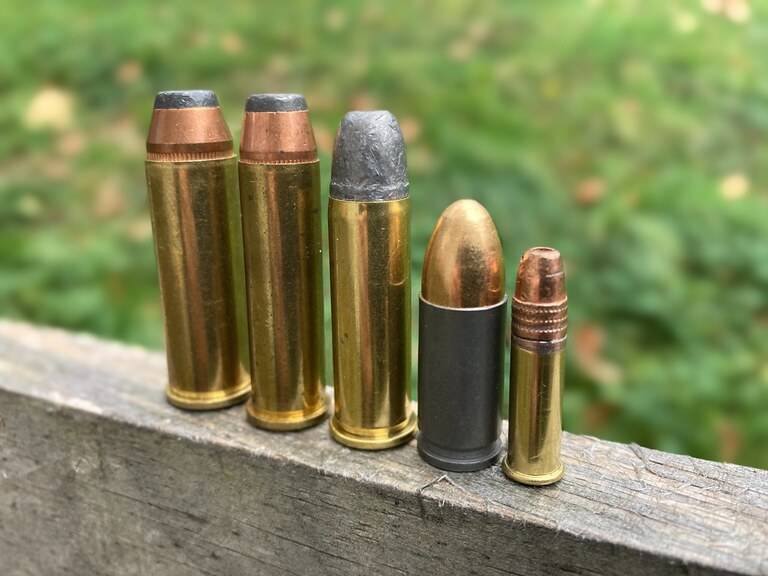As a firearms enthusiast, understanding bullet sizes and their impact on handgun performance is crucial. In this blog post, we'll dive into bullet sizes comparison, explore different bullet sizes, examine bullet caliber sizes, and discuss the importance of selecting the right ammunition for your handgun. Whether you're a seasoned shooter or a beginner, this guide will provide valuable insights and help you make informed decisions when it comes to choosing the perfect bullet size for your needs.

Before exploring the intricacies of bullet sizes, it's crucial to grasp the basic concepts of "bullet size" and "caliber." These terms lay the foundation for understanding the compatibility and performance of ammunition in different firearms, ensuring a safe and effective shooting experience.

Bullet size, also commonly referred to as caliber or calibre, is a term used to describe the diameter of a bullet or the internal diameter of a firearm's barrel. It is a crucial factor in determining the performance, compatibility, and overall effectiveness of a particular ammunition type in a given firearm.
Bullet size is typically measured in either inches or millimeters, depending on the region and the specific ammunition in question. The size plays a critical role in the ballistic properties of a projectile, including its velocity, trajectory, energy transfer, and penetration.
A larger caliber bullet generally has a greater mass and can carry more energy, which can result in increased stopping power and penetration. However, larger calibers may also produce greater recoil and reduced magazine capacity, which can affect a shooter's control and accuracy.
Conversely, smaller caliber bullets are usually lighter, producing less recoil and allowing for higher magazine capacities, but may deliver less energy on impact.
Ultimately, the selection of bullet size depends on a balance between various factors, such as the intended use of the firearm, the user's skill level and preferences, and the desired balance between stopping power, accuracy, and recoil management.

Caliber, often interchangeably used with the term "bullet size," refers to the measurement of the diameter of a projectile or the internal diameter of a firearm's barrel. This dimension is a critical aspect of both ammunition and firearms, as it directly impacts the compatibility, performance, and efficiency of a given ammunition type in a specific firearm. Caliber is typically expressed in either inches or millimeters, with the choice of unit depending on regional preferences and the particular ammunition being discussed.
The caliber of a bullet influences various ballistic properties, such as velocity, trajectory, energy transfer, and penetration, all of which contribute to the overall effectiveness of the projectile. Larger calibers, which have a greater diameter and mass, typically possess increased stopping power and penetration capabilities due to their higher energy-carrying potential. However, they may also generate more recoil and limit magazine capacity, affecting a shooter's control, comfort, and accuracy.
On the other hand, smaller calibers are often lighter and produce less recoil, facilitating better control and higher magazine capacities. Nevertheless, they may lack the energy transfer and penetration power of their larger counterparts. In choosing the appropriate caliber, a variety of factors must be considered, such as the intended application of the firearm, the shooter's skill level, and the desired balance between stopping power, precision, and recoil management. Ultimately, the optimal caliber selection hinges on the specific needs and preferences of the individual shooter.
Choosing the right bullet size for your handgun is crucial for several key reasons, each of which plays a significant role in the overall shooting experience:
Using the correct bullet size is paramount in ensuring that your firearm operates safely and reliably. Mismatched ammunition can result in various malfunctions, including jams, misfires, or even catastrophic failures, such as a barrel explosion. These issues not only disrupt your shooting experience but also pose a considerable danger to both the shooter and those nearby.
The bullet size directly impacts essential performance aspects of your handgun. These characteristics include accuracy, which determines how consistently your shots hit the intended target; recoil, which refers to the backward momentum experienced when firing the weapon; and terminal ballistics, which encompass the behavior of the projectile upon impacting the target.
The right bullet size can significantly enhance these performance aspects, making your shooting experience more enjoyable and effective.
Depending on your specific purpose for using a handgun, such as self-defense, target shooting, or hunting, choosing the appropriate bullet size is crucial for optimizing the firearm's effectiveness. For instance, self-defense scenarios may require a bullet with greater stopping power, while target shooting may prioritize accuracy and minimal recoil.
Understanding different bullet sizes and their respective capabilities ensures that you can make informed decisions when purchasing ammunition. Selecting the right ammunition for your handgun not only guarantees safe and reliable function but also helps you tailor your shooting experience to your preferences and requirements.
By comprehending the various bullet sizes and their applications, you can make cost-effective choices when buying ammunition. This understanding allows you to avoid wasting money on incompatible or suboptimal ammunition, which could lead to a less satisfying shooting experience.

The .22 Long Rifle, commonly referred to as the .22 LR, is a small and lightweight rimfire cartridge. It has been widely used for various purposes such as target shooting, small game hunting, and self-defense. It is one of the most affordable and popular calibers for handguns.
Pros:
Low recoil, making it suitable for beginners
Versatile for different shooting applications
Wide variety of handguns chambered for .22 LR
Cons:
Limited stopping power and penetration
Rimfire ammunition can be less reliable than centerfire

The .380 Automatic Colt Pistol (ACP) is a compact centerfire cartridge designed for concealed carry and self-defense. It offers a good balance between size, weight, and stopping power for smaller handguns.
Pros:
Moderate recoil, making it manageable for most shooters
Adequate stopping power for self-defense
Wide variety of compact handguns chambered in .380 ACP
Cons:
Limited range and accuracy
More expensive ammunition than .22 LR

The 9mm Luger, also known as the 9x19mm Parabellum, is one of the most popular and widely used handgun calibers in the world. It offers a great balance between stopping power, recoil, and ammunition capacity.
Pros:
Moderate recoil, suitable for most shooters
High ammunition capacity in many handguns
Widely available and affordable ammunition
Cons:
Not as powerful as some larger calibers

The .40 Smith & Wesson is a popular centerfire cartridge that offers increased stopping power compared to the 9mm Luger. It is widely used by law enforcement and for self-defense.
Pros:
Wide variety of handguns chambered in .40 S&W
Used by many law enforcement agencies
Cons:
Lower ammunition capacity compared to 9mm Luger
More expensive ammunition than 9mm Luger

The .45 Automatic Colt Pistol (ACP) is a large caliber cartridge with a reputation for excellent stopping power. It is often considered the benchmark for self-defense and has a long history of military and law enforcement use.
Pros:
Wide variety of handguns chambered in .45 ACP
Proven track record in military and law enforcement use
Cons:
Lower ammunition capacity compared to 9mm Luger and .40 S&W
More expensive ammunition than 9mm Luger and .40 S&W
Selecting the right bullet size is crucial, but don't overlook the importance of choosing a top-notch concealed carry holster like the Praetorian Shoulder Holster. Elevate your shooting skills while enjoying a secure, comfortable fit for most gun sizes, thanks to its expertly designed construction and superior quality control. Make the Praetorian your trusted partner in mastering the art of marksmanship and achieving optimal performance.
Are you having fun reading with Dinosaurized? Here's a little gift for better shopping experience~
Enter this 15% Discount code: "GundiscussionD15" at Checkout now~

This table provides a comparison of the three factors influencing bullet performance: muzzle velocity, energy, and penetration.
Discover an extensive selection of premium shooting range essentials and top-notch concealed carry gear tailored for gun enthusiasts, all designed to enhance your experience and elevate your results - explore here!
Are you having fun reading with Dinosaurized? Here's a little gift for better shopping experience~
Enter this 15% Discount code: "GundiscussionD15" at Checkout now~

Consider the primary use of your handgun. Different bullet sizes and calibers excel in specific situations, so it's essential to choose the one that best aligns with your intended purpose. For instance, self-defense situations may require a round with more stopping power, while target shooting and hunting may prioritize accuracy and range.
Recoil can vary significantly between calibers. If you're sensitive to recoil, consider opting for a smaller caliber with less recoil, making it easier to handle and shoot accurately. On the other hand, if you're comfortable managing recoil, a larger caliber with more stopping power may be appropriate.
The size of your handgun and its ammunition capacity are important factors when choosing a bullet size. Smaller calibers typically offer higher capacity, while larger calibers may have lower capacity. Additionally, compact and subcompact handguns are better suited for concealed carry but often come in smaller calibers.

9mm Luger or .380 ACP are popular choices for their balance of stopping power, manageable recoil, and compact size. Both calibers offer a wide range of handgun options for concealed carry.
.22 LR is an excellent choice for target shooting and those new to shooting sports. It offers low recoil, making it easier to learn proper shooting techniques, and the ammunition is affordable for extended practice sessions.
For hunting small game, the .22 LR is often sufficient. However, for larger game, you may want to consider a more powerful caliber, such as the 10mm Auto or even a revolver chambered in .357 Magnum or .44 Magnum, depending on the game species and local regulations.
9mm Luger, .40 S&W, and .45 ACP are all suitable choices for home defense. Each caliber offers adequate stopping power, and the handguns chambered for these rounds come in various sizes and capacities. Personal preference, recoil sensitivity, and handgun size should be considered when selecting the right caliber for home defense.
Ultimately, the best bullet size for your handgun will depend on your specific needs, preferences, and the factors outlined above. It's essential to try different calibers and handguns before making a decision, as personal comfort and confidence in handling the firearm play a significant role in overall effectiveness.
There is no definitive answer, as the best caliber for self-defense depends on factors like personal preference, recoil sensitivity, and handgun size. However, popular choices include 9mm Luger, .380 ACP, .40 S&W, and .45 ACP due to their balance of stopping power, manageable recoil, and availability.
Not necessarily. While larger calibers generally have greater stopping power, other factors such as bullet design, energy transfer, and shot placement play crucial roles in determining the effectiveness of a round. Smaller calibers with proper bullet design and shot placement can still be effective for self-defense.
Consider factors such as the intended purpose (self-defense, target shooting, hunting), recoil sensitivity, and handgun size and capacity when choosing a bullet size for your handgun. Different calibers perform better in specific situations, and personal comfort and confidence in handling the firearm are also essential.
Some handguns are designed to accept multiple calibers with interchangeable barrels, cylinders, or conversion kits. However, always consult the firearm manufacturer's recommendations and ensure proper compatibility before using different bullet sizes in the same handgun.
Laws regarding high-capacity magazines vary depending on the country, state, or local jurisdiction. It is crucial to research and comply with the regulations specific to your location before purchasing or possessing a handgun with a high-capacity magazine.
In conclusion, understanding bullet sizes, calibers, and handgun types is essential for choosing the right firearm and ammunition for your specific needs. Whether you're a beginner or an experienced shooter, taking the time to research and consider factors such as purpose, recoil sensitivity, and handgun design will ensure you make an informed decision.
While there is no one-size-fits-all answer when it comes to selecting the perfect caliber or handgun, personal comfort and confidence in handling your firearm play significant roles in overall effectiveness.
By using this comprehensive guide as a starting point, you'll be better equipped to navigate the world of bullet sizes and handguns, ultimately finding the best fit for your unique requirements and preferences.
Recent Articles:
Mastering Glock Conversions: A Guide To The Best Glock Conversion Kits
Maximizing Your Range Time: A Guide To Shot Timers
Clip Vs. Magazine: Clearing Up The Confusion For Gun Owners
From Range to Tactical: The Best AR Pistols For Every Purpose
Single vs Double Magazine Showdown: Which One Wins For Reliability and Capacity ?
Mastering Barrel Measurement: Understanding The Importance of Accurate Barrel Lengths
Are you having fun reading with Dinosaurized? Here's a little gift for better shopping experience~
Enter this 15% Discount code: "GundiscussionD15" at Checkout now~